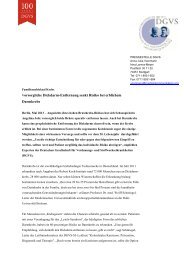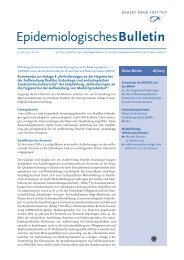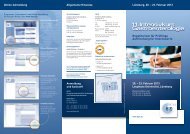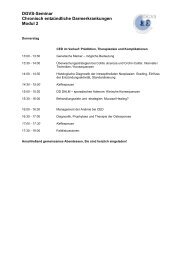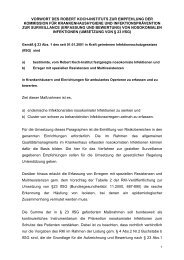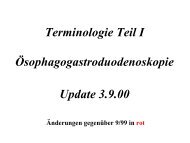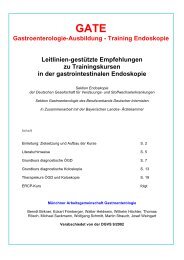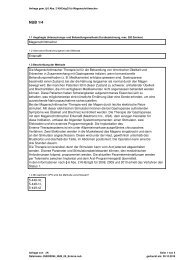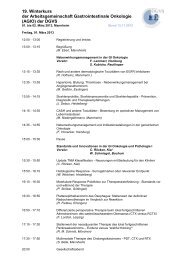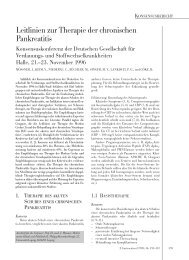S3-Guideline “Exocrine Pancreatic Carcinoma” 20071 ... - DGVS
S3-Guideline “Exocrine Pancreatic Carcinoma” 20071 ... - DGVS
S3-Guideline “Exocrine Pancreatic Carcinoma” 20071 ... - DGVS
You also want an ePaper? Increase the reach of your titles
YUMPU automatically turns print PDFs into web optimized ePapers that Google loves.
472<br />
Leitlinie<br />
Comment<br />
There is no special literature on this topic. The recommendations<br />
are based on experience in standard clinical practice.<br />
Recommendation<br />
Principally there are two palliative therapeutic procedures available<br />
for obstruction of the duodenum: an endoscopic stent placement<br />
or a surgical gastroenterostomy. The literature that is available<br />
does not demonstrate a superiority of one of the methods.<br />
Recommendation grade: B, evidence level 3, consensus<br />
Comment<br />
The data published are mainly monocentric case study collections<br />
of patients with duodenal obstruction of different origins<br />
[294, 295]. There are no randomized prospective studies that<br />
compare endoscopic stenting and surgical gastroenterostomy.<br />
Prophylactic gastroenterostomy<br />
Recommendation<br />
According to the current data it seems sensible to perform a prophylactic<br />
gastroenterostomy if irresectability is diagnosed during<br />
surgery.<br />
Recommendation grade: C, evidence level 2b, consensus<br />
Comment<br />
The publication on this topic, a monocentric, prospective, randomized<br />
study shows that a prophylactic gastrojejunostomy<br />
for non-resectable periampullary carcinoma significantly reduces<br />
the future development of pyloric stenosis [145].<br />
Importance of hematopoetic growth factors for locally<br />
advanced pancreatic carcinoma<br />
Recommendation<br />
Granulocyte-stimulating growth factors (G-CSF or GM-CSFs) are<br />
not important for the supportive therapy of locally advanced pancreatic<br />
carcinoma.<br />
Recommendation grade: A, evidence level 1, strong consensus<br />
Comment<br />
Chemotherapy that is so aggressive that the administration of<br />
granulocyte-stimulating growth factors is necessary is not recommended<br />
for palliative treatment of locally advanced or metastatic<br />
pancreatic carcinoma. Refer to the current guidelines of<br />
ASCO on the use of growth factors [296].<br />
Recommendation<br />
Erythrocyte-stimulating growth factors (erythropoietin) can under<br />
certain circumstances play a role.<br />
Recommendation grade: A, evidence level 1, strong consensus<br />
Comment<br />
Also, refer to the current guidelines of ASCO [297] or EORTC<br />
[298].<br />
Adler G et al. <strong>S3</strong>-<strong>Guideline</strong> <strong>“Exocrine</strong> <strong>Pancreatic</strong>… Z Gastroenterol 2008; 46: 449–482<br />
Role of cytoprotectives/radical scavengers during<br />
chemotherapy and/or radiation therapy of pancreatic<br />
carcinoma<br />
Recommendation<br />
Amifostin or other cytoprotectives do not play a role in chemotherapy<br />
and/or radiation therapy of pancreatic carcinoma.<br />
Recommendation grade: A, evidence level 1, strong consensus<br />
Comment<br />
This recommendation follows the meta-analysis of the chemotherapy<br />
and radiation therapy expert panel of the ASCO [299].<br />
Evaluation of pancreatic carcinoma patients’ quality of<br />
life<br />
Recommendation<br />
QLQ-C30 and the related specific pancreas module QLQ-PAN 26 offer<br />
suitable tools for the assessment of quality of life.<br />
Recommendation grade: D, evidence level 5, consensus<br />
Comment<br />
The routine implementation of QLQ-C30 and QLQ-PAN 26 are<br />
only reasonable for clinical studies.<br />
Follow-up<br />
Follow-up program after curative resection<br />
Recommendation<br />
A structured follow-up program cannot be recommended independent<br />
of the pancreatic carcinoma stage.<br />
Recommendation grade: A, evidence level 5, consensus<br />
Comments<br />
There is no scientific proof that structured follow-up with regular<br />
staging examinations leads to an improvement of the survival<br />
of patients with pancreatic cancer.<br />
Medical history and a physical examination are necessary if exocrine<br />
or endocrine insufficiency is suspected. The examination<br />
can be performed regularly by a general practitioner.<br />
Rehabilitation following curative pancreatic carcinoma resection<br />
Recommendation<br />
For individual patients rehabilitation may be useful under certain<br />
conditions. This should be coordinated with the family.<br />
Recommendation grade: D, evidence level 5, consensus<br />
Comment<br />
There is no assessable literature on the role of rehabilitation<br />
after pancreatic carcinoma resection with curative intent.<br />
Acknowledgements<br />
!<br />
We would like to thank the staff of the Clinic for Internal Medicine<br />
I, University of Ulm, T. Locher, R. Lorenz, M. Porzner, I. Rueß,<br />
A. Stein, E. Thanner, and Christian Aslan for the support in preparing<br />
and implementing the consensus conference.<br />
Downloaded by: Thieme Verlagsgruppe. Copyrighted material.



